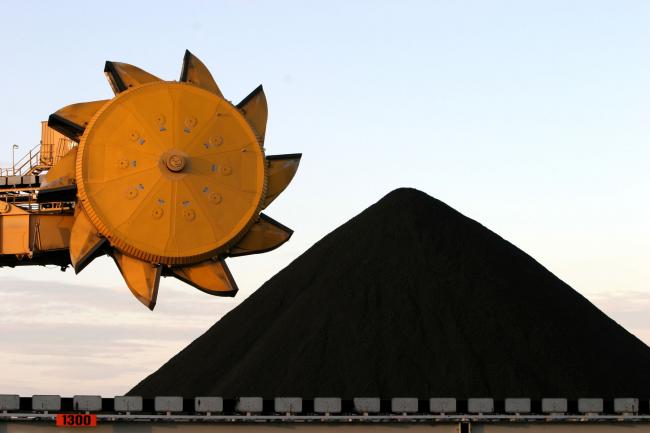(Bloomberg) -- Chinese officials are jamming up imports of Australian coal, with at least one major port suspending customs clearance, but Beijing has denied a report of an official ban.
The foreign ministry on Friday said the report of a block on Australian coal at one northern port was false, echoing information from miners, Canberra lawmakers and people familiar with official orders in China. The news had roiled markets on Thursday as it was seen as a sudden escalation of trade tensions between the two countries.
For several weeks, China has been targeting Australian coal imports by slowing down customs clearance, resulting in delays at ports and stoking speculation that Beijing is retaliating against a ban on Chinese telecommunications giant Huawei Technologies Co. Markets are spooked that it could be the start of more widespread import curbs against Australia, which counts China as its biggest trading partner.
Signs that Australian coal is being singled out first emerged at the end of January. Just before the start of the Lunar New Year holidays, Chinese customs officials told some local authorities to start controlling shipments from Australia, without giving explicit instructions as to how or why, according to a person with knowledge of the order, who asked not be identified because they’re not authorized to speak publicly.
While the local officials acted on the order in various ways, the general effect was to extend clearance for Australian coal to more than 40 days. It typically takes about five to 20 days.
Some local customs authorities have gone as far as suspending clearance. That includes five harbors in the northeastern port of Dalian, according to the people with knowledge of operations there. While Reuters on Thursday said Dalian had banned Australian imports altogether, the people said there hasn’t been an official order to that effect. Australian coal can still arrive at Dalian, but can’t clear customs for now, the people said.
On Friday, China’s foreign ministry spokesman said that reports the nation had banned Australian coal imports are false.
Receiving Imports
“The ports in China are all receiving import declarations for imported coal, including that from Australia,” the foreign ministry spokesman, Geng Shuang, told reporters Friday in Beijing. Customs officials are stepping up efforts to analyze and monitor the quality and safety of imported coal, he added.
Nobody answered two calls to the General Administration of Customs. A media official at Dalian Port Group declined to comment.
Australian officials have downplayed the notion that Beijing is flexing its muscle as punishment for perceived geopolitical slights. While acknowledging that China’s processing of coal imports may have slowed, Trade Minister Simon Birmingham on Friday said there “was no basis to believe that there is a ban on Australian coal exports into China.”
Prices for Australian coking coal, which is used to make steel, actually rose on Thursday after the reports of a ban. Spot premium hard coking coal shipped from Australia gained 3.8 percent to $215.09 a ton, the highest since Jan. 2, according to Fastmarkets MB. Prices would have fallen if there was a ban in place, according to Daniel Hynes, an analyst at Australia & New Zealand Banking Group Ltd.
Getting Through
“Our channel checks so far suggest while there are delays in getting imported coal, it is still getting through,” Hynes said in a research note Friday. “This has been confirmed by our own conversations with buyers in China.”
China produces about half of the world’s coal, but it relies on overseas supply for some thermal coal, which is used for power generation, and high-quality coking coal, an Australian specialty that’s used to produce steel. China was the second-biggest customer of Australia’s coal last year, accounting for about 23 percent of total exports, according to Australian government data. Dalian takes about 2 percent of Australia’s coal exports.
Customs at Dalian have informed the port that its total coal import quota for 2019 would be cut to 12 million tons, according to one of the people. Imports cannot exceed that level but the quota applies to all countries including Australia, Russia and Indonesia, the person said.
China has often tweaked its coal import policies in recent years as a tool to manage its domestic market. The government has occasionally clamped down on inbound shipments to encourage demand for domestic supply and then relaxed those curbs to cool price rallies, but hasn’t set a pattern of singling out specific countries for limits.
“We do understand that China applies, in some areas, restrictions in relation to the volume of coal,” Birmingham told reporters in Adelaide on Friday. “The application of those quotas, combined with different testing and the quality assurance and environment in testing centers, may be slowing down the processing” of coal, he said.
(Updates with Chinese government comment in second paragraph.)
